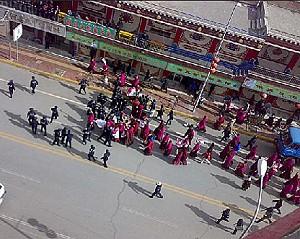Brutal suppression of students protesting at a Tibetan campus this March resulted in at least dozens of students killed, an eyewitness told The Epoch Times’ sister media NTD.
Recently, the informant revealed that after witnessing the persecution of students in the Tibetan capital of Lhasa and realizing the domestic Chinese media chose to remain silent, he decided to disclose the brutality to overseas media.
Campus Lockdowns
According to the witness, who has requested to be kept anonymous for risk to his life, campus lockdowns in Tibet have been an old routine since 2009.“It’s been ongoing for 16 years, and it’s typically closed for a month or two each year; except for this year, it’s lasted for the entire semester,” the witness said.
The annual lockdown of Tibetan campuses stem from the “3.14” incident of March 14, 2008, when the Chinese Communist Party (CCP) dispatched armed police to suppress monks protesting against human rights violations in Tibet. The suppression led to casualties to nearly 100 people and hundreds of arrests.
March 10 is also a politically sensitive date as it marks the date in 1959 when thousands of Tibetans took to the streets of Lhasa as the CCP invaded Tibet and attempted to remove the Dalai Lama, who then fled into exile in India.
Since 2008, Beijing has mandated an annual lockdown of local campuses every March around the sensitive dates.
Lhasa Teachers College, the only normal college in the Tibet Autonomous Region that trains basic education teachers and the only college in Lhasa, has carried out the policy very comprehensively, according to the witness.
He explained the college extended the lockdown this year because a female student talked about the lockdown to overseas media. Consequently, the student went missing after the police arrested her. Local authorities also conducted extensive investigations into thousands of students.
He said that the police arrested at least 30 more students with the peculiar excuse that they had registered for a Google email account using overseas websites.
“They needed to apply to foreign universities. Many domestic email services couldn’t reliably deliver their email communications, so they resorted to using Google email,” the witness explained.
He described the authorities adopting prison control measures during the campus lockdowns. For instance, there is barbed wire on campus walls, steel pipes in classrooms, no hospital visits for sick students, and no delivery or take-out orders are permitted. The only cafeteria and supermarket even monopolize prices during lockdowns.
According to the witness, the price of a cup of soybean milk and a steamed bun could be seven times higher than normal.
Some students intended to seek help from the principal with the hope of lifting the lockdown earlier, but were faced with threats of being reported to the police and arrested on charges of “anti-state crimes” or “espionage.”
“The principal rejected a petition the students presented to him, tore up the paper, and identified the students through visiting each class,” the witness said.
According to the witness, there were 120 students who signed and thumb-stamped the petition, and received punishment from the principal.
The students reached out to domestic Chinese media for assistance. However, these media outlets published no reports and proceeded to blacklist all the students who sought help.
Facing a dead end, the students once again reached out to overseas media for assistance. However, they were swiftly detected by the police, triggering a wider and more stringent control on all campuses.
The authorities installed more surveillance cameras, the witness said, “Even inside the dorm, they know what you are doing inside the room … in the cafeteria, you can’t talk, because they would know what you are saying.”
Each student must install an app known as “Clean Cafeteria,” essentially a location-tracking device, which allows the police to locate the students and the students must report their daily whereabouts in detail through this app.
He mentioned that one particular student was abruptly awakened in the middle of the night by numerous phone calls because she forgot to fill out the form. The calls came from counselors, the student affairs office, and even the police.
“She fell from her bunk bed and broke her leg,” he said, and she’s been kept in a mental hospital to this day.
On March 16, a protest erupted at Lhasa Teachers College as 500 students staged a sit-in on the sports field, demanding to meet with the principal. Instead, they were met with hundreds of armed police.
According to the witness, the police wielded batons as weapons and physically assaulted students. Two students were beaten to death on the spot in the chaos, while several others were trampled to death. Additionally, a couple more students died by jumping off buildings as a form of protest while holding signs that read, “I was forced to death by the Chinese government.”
“In reality, more than a dozen lives were lost; at that time, over 20 people had died,” the witness said.
Presently, the police continue their heightened their surveillance of the students, and there are continuous cases of students being detained for contacting individuals outside. Additionally, the college has forced students to use facial recognition for attendance purposes, aiming to gain better control over their whereabouts.






